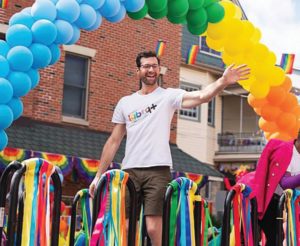Comedian Billy Eichner has done a blitzkrieg of interviews on behalf of the new gay romantic comedy Bros, a movie that he co-wrote and stars in and which has now opened in thousands of theaters nationwide, including Waters Edge Cinema in Provincetown and Wellfleet Cinemas. In these appearances, Eichner never fails to explain why he felt compelled to get it done. There simply was no gay equivalent to mainstream major studio romcoms such as Pretty Woman, Eichner says. He may have watched the tragic gay romance Brokeback Mountain one time, but he can’t get enough of Pretty Woman — he’s seen it 50 times. Queer indie love stories (of which there are many, including the recent Fire Island) just don’t have the Hollywood glamour that he craves.

Eichner is correct in one sense: there has been no LGBTQ equivalent to the contrived, plastic, and weightless blockbuster Pretty Woman. But Bros is far more funny, thoughtful, and realistically human than Garry Marshall’s film starring Richard Gere as a well-dressed playboy and Julia Roberts as an adorable call girl.
Eichner’s pitch, presumably honest, is meant to position Bros in the mainstream without compromising its groundbreaking validity to queer audiences. And the studio distributing the movie, Universal Pictures, seems to be taking that marketing strategy seriously. At a time when the culture wars are heating up, Universal’s poster image for the film features two men together, seen from behind, with hands smack on each other’s jean-clad butts. Company spokespeople have said they’re hoping to make Bros a date-night movie, and it remains to be seen whether straight men will be dragged to it by their girlfriends or wives — for the time being, it’s playing only in theaters and not streaming.
In any case, Bros — which is directed by Nicholas Stoller (Forgetting Sarah Marshall; Neighbors), who co-wrote the script with Eichner (and whose in-laws live in Wellfleet) — does a fine job of assuring queer moviegoers that they are the intended audience. The movie speaks directly to gay men of different generations. And that, in a Hollywood studio film, is still radical. Though the R-rated sex scenes are not full-frontal, the logistics may shock some people. But even if Gov. DeSantis of Florida prohibits it from being screened in schools, the movie never panders to straight audiences — and it probably won’t alienate them, either, at least on this side of the culture wars.
Eichner, who plays Bobby, a gay podcast commentator and director of a start-up LGBTQ history museum in Manhattan, is essentially playing a fictionalized version of himself. Bobby is not quite as brash as Eichner’s “Billy on the Street” persona (that is, the candid comedy bits he shoots with a roaming camera on the streets of Manhattan), but he’s familiarly fast-talking, hyperactive, jaded, insecure, and judgmental. Luke Macfarlane, who plays Bobby’s object of affection, is reserved and quietly butch. His character, Aaron, is an estate lawyer who hates his job. But in the bars at night, his steroid-enhanced bod looks gorgeous in revealing clothes, and he radiates sexual confidence.

As always in romantic comedy, their mutual attraction is unlikely and must brook obstacles. Neither character has had a long-term relationship after decades of hookups. Eichner’s Bobby longs for romance but doesn’t trust it; Macfarlane’s Aaron seeks in Bobby the kind of engagement he lacks — he’s attracted to his spirit. It’s an old trope: finding the sexiness inside rather than in appearances. But it’s sheathed here in a wealth of clever detail. And, most important, the jokes land right where they’re supposed to — Bros scores plenty of huge laughs — and the performances are thoroughly persuasive and skilled. This is true even of the smaller roles. Bowen Yang, for example, who was wasted in Fire Island, is hilarious in Bros playing a Ryan Murphy–like television mogul. (In another first, all the actors playing gay are out in real life.)
The movie’s verisimilitude comes through when it counts the most: when characters are vulnerable and hurt and their yearning must stand in for ours. One could find fault with some aspects of the story or execution, but it’s just quibbling. For example, Bobby and Aaron take a trip to Provincetown at one point so Bobby can represent his museum in a pride parade. The town looks great in these scenes — it’s a far more positive and PR-friendly representation than those in recent TV series — but it’s mostly show-biz gloss (such as Harvey Fierstein playing an innkeeper), and some of the location shooting was clearly done elsewhere. Back in New York City, the arguments about political correctness at Bobby’s LGBTQ museum contain reductive and stereotypical satire. And, inevitably, there will be some in the queer community who resent the cis white male navel-gazing, no matter how many times Bobby apologizes for doing just that.
Overall, however, Bros is a triumph for producer Judd Apatow and Eichner. Whether or not it scores nationally at the box office, it will surely go on to have a long life on the small screen. With its fast-moving and richly entertaining script, its abundant celeb cameos and in-jokes, it will satisfy a variety of audiences and tastes — and that’s what the mainstream (in this case, liberal Hollywood mainstream) does best. Queer family values are celebrated. In a world of growing threats to the LGBTQ minority, the only thing to fear in Bros is fear itself. Besides, it’s a whole lot of fun.



